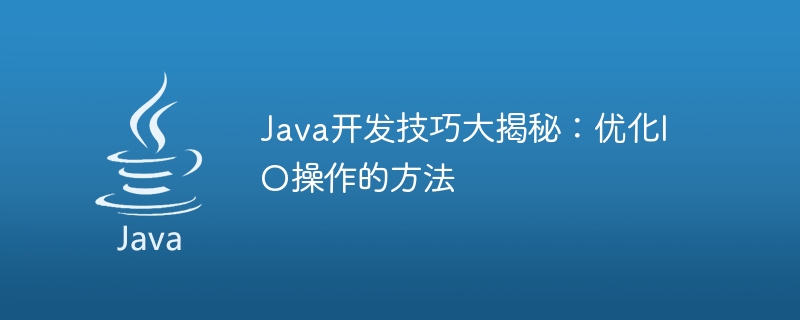Home >Java >javaTutorial >Java development skills revealed: methods to optimize IO operations
Java development skills revealed: methods to optimize IO operations
- PHPzOriginal
- 2023-11-20 10:00:551449browse

Java is a powerful programming language that is widely used to develop various applications and systems. In the Java development process, optimizing IO operations is a very important skill. Efficient IO operations can not only improve program performance, but also improve user experience. This article will reveal some methods to optimize Java IO operations and help developers make better use of Java for IO operations.
1. Using buffers
Java provides a variety of IO streams, such as FileInputStream, FileOutputStream, BufferedReader, BufferedWriter, etc. These classes provide buffer functionality. The buffer can reduce the number of interactions with the underlying device and improve the efficiency of IO operations. For read and write operations on large files, using buffers can significantly improve performance.
2. Reasonably choose the appropriate IO stream
In Java, there are many different IO streams, such as byte stream, character stream, object stream, etc. Choosing the appropriate IO stream can improve the execution efficiency of the program. Generally speaking, byte streams are suitable for reading and writing binary data, and character streams are suitable for reading and writing text data. If you are dealing with text files, it will be more efficient to use character streams for IO operations.
3. Use NIO for IO operations
Java NIO (New Input/Output) is a faster IO operation method that introduces the concepts of Channel and Buffer. Compared with traditional IO operations, NIO is more efficient and can achieve non-blocking IO. NIO implements event-driven IO processing through selectors and can handle multiple IO connections at the same time.
4. Appropriate use of memory mapped files
Memory mapped files are an efficient IO operation method that can map files directly into memory to achieve random access to files. Using memory mapped files can reduce the frequency of IO operations and improve the efficiency of file reading and writing.
5. Use buffered streams for IO operations
Java provides buffered stream classes such as BufferedInputStream and BufferedOutputStream, which can improve the efficiency of IO operations. Buffered streams create an internal buffer, reducing direct interaction with the underlying device.
6. Use non-blocking IO
Java provides the java.nio.channels package, which can use non-blocking IO for network programming. Non-blocking IO does not need to wait for the IO operation to complete and can perform other tasks while the IO operation is in progress. Using non-blocking IO can improve the concurrency performance of the program and enhance the throughput of the system.
7. Appropriate use of compression and decompression technology
For applications that need to transmit large amounts of data, rational use of compression and decompression technology can reduce data transmission time and bandwidth consumption. Java provides compression and decompression classes such as GZIP and ZIP, which can easily implement data compression and decompression operations.
8. Avoid using repeated IO operations
When writing code, try to avoid repeated IO operations. Repeated IO operations will increase the burden on the system and affect the performance of the program. IO results can be saved in memory to avoid repeated IO operations.
9. Close IO resources
After using IO resources, they should be closed in time. Unclosed IO resources will occupy system resources and reduce system performance. You can use try-with-resources syntactic sugar to automatically close IO resources to ensure the normal release of resources.
Summary: Optimizing IO operations can improve program performance and shorten IO operation time. This article introduces some methods to optimize Java IO operations, such as using buffers, selecting appropriate IO streams, using NIO and non-blocking IO, etc. During the development process, developers can choose appropriate optimization methods based on specific needs to improve program efficiency. Continuously learning and mastering the skills to optimize IO operations will make Java development more efficient and professional.
The above is the detailed content of Java development skills revealed: methods to optimize IO operations. For more information, please follow other related articles on the PHP Chinese website!

